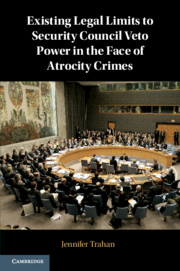Book contents
- Existing Legal Limits to Security Council Veto Power in the Face of Atrocity Crimes
- Existing Legal Limits to Security Council Veto Power in the Face of Atrocity Crimes
- Copyright page
- Contents
- Foreword
- Acknowledgments
- Introduction
- 1 The Origins and History of the Veto and Its Use
- 2 Acting in the Face of Atrocity Crimes
- 3 Initiatives to Voluntarily Restrain Veto Use in the Face of Atrocity Crimes
- 4 Questioning the Legality of Veto Use in the Face of Genocide, Crimes against Humanity, and/or War Crimes
- 5 Case Studies
- Index
2 - Acting in the Face of Atrocity Crimes
Humanitarian Intervention and the Responsibility to Protect
Published online by Cambridge University Press: 15 August 2020
- Existing Legal Limits to Security Council Veto Power in the Face of Atrocity Crimes
- Existing Legal Limits to Security Council Veto Power in the Face of Atrocity Crimes
- Copyright page
- Contents
- Foreword
- Acknowledgments
- Introduction
- 1 The Origins and History of the Veto and Its Use
- 2 Acting in the Face of Atrocity Crimes
- 3 Initiatives to Voluntarily Restrain Veto Use in the Face of Atrocity Crimes
- 4 Questioning the Legality of Veto Use in the Face of Genocide, Crimes against Humanity, and/or War Crimes
- 5 Case Studies
- Index
Summary
This chapter explores two doctrines that developed in response to Security Council paralysis or inaction in the face of atrocity crimes. The first is the doctrine of humanitarian intervention, most famously invoked in 1999 to justify the intervention of NATO in Kosovo, although largely dismissed by most states as impermissible, at least under a strict reading of the UN Charter. The second doctrine is the “responsibility to protect” (“R2P”), which was first formulated in 2001 but has since undergone significant modifications. Because the later formulations of R2P require Security Council authorization for any forceful intervention, R2P ultimately fails to address the problem of Security Council paralysis in the face of atrocity crimes. Furthermore, because R2P was invoked as part of the 2015 intervention in Libya, which left a destabilized state, and appears to have been largely ignored with respect to atrocities in Syria, enthusiasm for R2P may be waning; some ideas for its revitalization are explored in the chapter. The chapter ultimately makes the case that until the international community solves the problem of veto use in the face of atrocity crimes, some states still will be tempted to invoke, or engage in, humanitarian intervention because there are currently no satisfactory alternatives to addressing Security Council paralysis blocking forceful intervention; yet, there remain significant dangers to such an approach. Ultimately, the chapter concludes that by addressing the problem of use, and threatened use, of the veto in the face of atrocity crimes, one could both strengthen R2P and lessen any need to invoke humanitarian intervention.
- Type
- Chapter
- Information
- Publisher: Cambridge University PressPrint publication year: 2020



